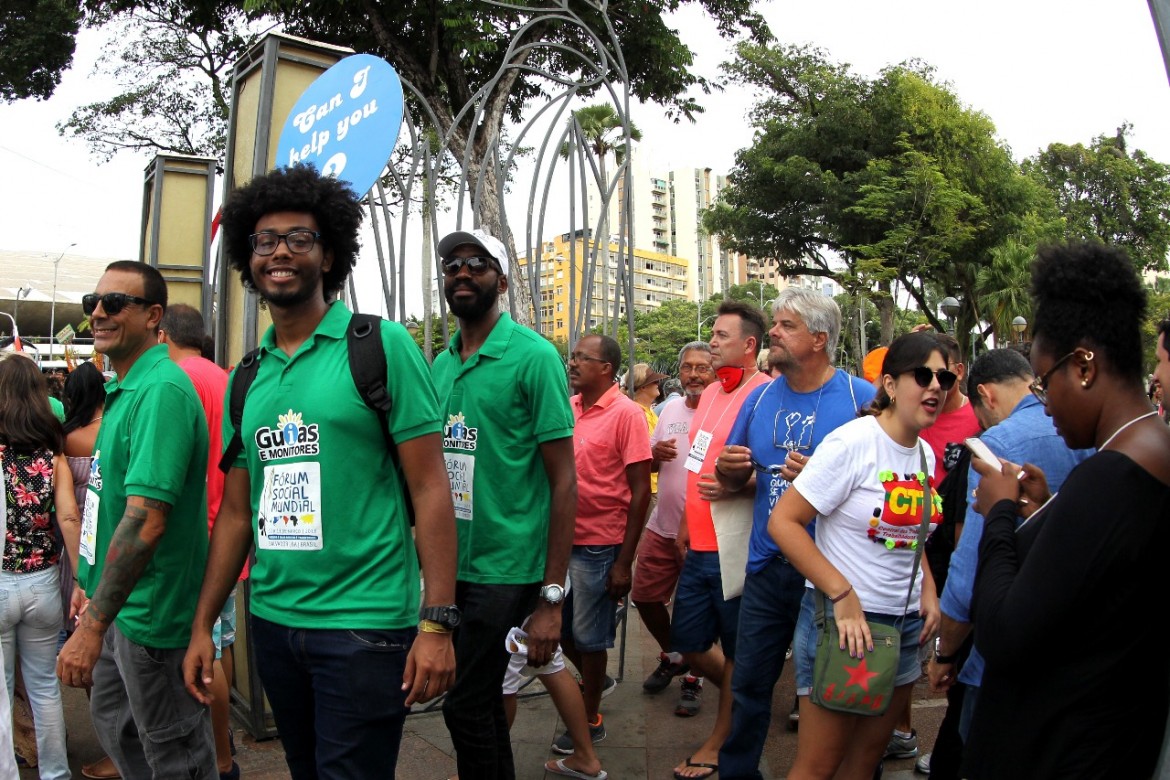Analysis
Right-wing violence hangs over Brazil civil society conference
Lula da Silva, no longer ascendant, rallies the World Social Forum, the Brazilian gathering of civil society. “They can do anything against us, but not against what we believe. They want to arrest me in order to silence me, but I will speak through you.”

More than 15 years have passed since Lula da Silva, newly elected president of Brazil, assured the enormous crowd of participants at the World Social Forum in Porto Alegre that he could not fail—because, he explained, his victory was not the triumph of a single individual, but of a people, the result of the political consciousness of the Brazilian working class.
It was impossible not to be moved by the exalting sentiment that the presence of a former metalworker at the head of the eighth industrial power in the world was finally showing the beginning of a comeback, the first instance of the Left being on the upswing since the fall of the Berlin Wall.
It didn’t really matter that the celebrations were, to some extent, spoiled by the controversy surrounding Lula’s announced presence later on at the Davos Economic Forum, the gathering of the powerful of the world against which the WSF was started in the first place. This was the first sign of a tendency toward class conciliation that would characterize the whole period of the government of the worker president.
Now, 15 years later, Lula has made a comeback at the World Social Forum, this time hosted in Salvador de Bahia, but nothing could be more different from back then. It is a different situation for Brazil, as the murder of activist and PSOL municipal councilor Marielle Franco showed in the most brutal way possible: the first political execution since the implementation of the military intervention in Rio decided by the Temer government, but also the reflection of the state of emergency into which the country is sinking a little more every day.
Everything is different also for Lula himself, the main target of the coup that started with the removal of Dilma Rousseff and which is planned to end in his arrest, a prospect more and more likely since the latest febrile attempts to prevent him being forced to start serving his sentence already after having been convicted by the appeals court seem doomed to failure.
But everything is also different for the World Social Forum, now “devoid of ideas, of a people and of struggle”—as pointed out by Aram Aharonian of the Centro Latinoamericano de Análisis Estratégico in one of several analyses on the state of its health—and unable to accomplish that task to which it was called by Arundhati Roy at the Forum in Mumbai in 2005: to “aim at real targets, wage real battles and inflict real damage.”
On the contrary, the enemy has been doing all the damage. Taking into account the state of the world, which has become more unequal, more violent and more ecologically unsafe in the meantime, it would be difficult to fault the conclusion of billionaire Warren Buffet, who has said that during the past 20 years there has been a class war, and his class won.
And yet, faced with the undeniable truth that Davos has defeated the World Social Forum, a defeat that in some places like Brazil is all too obvious, the passage from resistance to alternative, so proudly touted in Latin America, has again reversed the course of events.
It has been so effective that the latest edition of the WSF is taking place under the banner of resistance, marked by mourning for the death of Marielle Franco, an example of struggle offered to the Brazilian people so they might overcome their apathy and return to occupying the streets of their country, just as they have done in recent days to protest against the execution of the young black activist.
“The person who killed Marielle did not understand that her ideas are now even stronger than when she was alive,” said Lula during the “act in defense of democracy,” which took part at the Estádio Pituaçu in Salvador. He added, in reference to his own court case: “They can do anything against us, but not against what we believe. They want to arrest me in order to silence me, but I will speak through you. They want to arrest me so I can no longer get around, but I will walk with your legs.”
Originally published at https://ilmanifesto.it/un-porto-meno-alegre-per-analizzare-la-sconfitta/ on 2018-03-17
